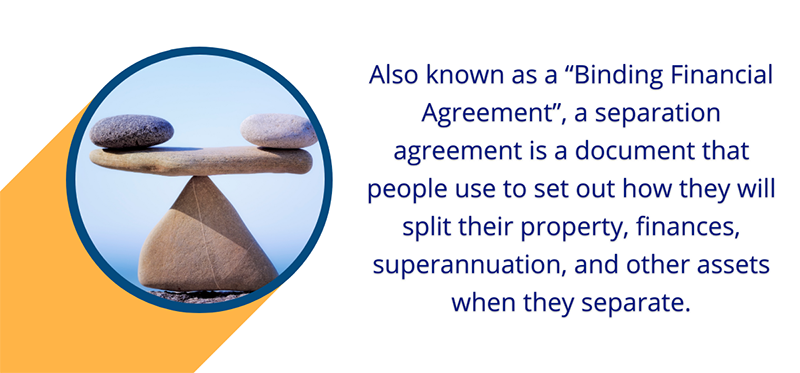In Australia, a “Separation Agreement” specifically refers to a financial contract that outlines the division of assets and liabilities when a marriage or de facto relationship comes to an end. Learn more about Using a Separation Agreement Template in Australia.
It is important not to confuse this term with the American term “legal separation agreement,” as they have different meanings and contexts.
Is There Legal Separation in Australia?
In the United States, “legal separation” refers to a formal process that a married couple can undergo to establish that they have separated. However, in Australia, there is no requirement for a court-ordered document to prove separation.
No specific legal process or court order is necessary to legally separate in Australia. While you may need to provide evidence of separation to certain government services like Centrelink, the forms required for this purpose are typically straightforward and can be completed online. It is important to note that only one party needs to believe that a separation has occurred and for that party to convey to the other that the relationship is over for it to be recognised legally in Australia.
What Is a “Separation Agreement” in Australia?
A separation agreement, also referred to as a “binding financial agreement,” (BFA) is a document used by individuals to set out the division of property, finances, superannuation, and other assets when they separate. Used for both de facto relationships and marriage, a separation agreement is a legal and binding alternative to resolving these matters in court.

How Do You Create a Separation Agreement in Australia?
The most common method to creating a separation agreement is to engage a law firm to take your instructions and draft the agreement on your behalf. However, if the parties are on amicable terms and willing to cooperate, they can save a significant amount of money on legal fees by using a separation agreement template and working together to complete it.
When you are Creating a DIY Separation Agreement in Australia yourself, you have the chance to find a mutually agreeable arrangement directly, without relying solely on lawyers to negotiate on your behalf.
Services like RP Emery can provide guidance and advice for a fixed fee, ensuring that your document complies with Australian law, specifically the requirements of the Family Law Act 1975. This approach can be a cost-effective option that still ensures your agreement meets all necessary legal standards.
To ensure a separation agreement is legally binding, both parties must seek independent legal advice and obtain a certificate confirming that they have received such advice. This step is crucial as it ensures that the agreement meets the necessary criteria to be considered valid by the Family Court. Without this legal advice, the agreement will not hold up in court, and if a dispute arises, the court will disregard the agreement, rendering the agreement worthless. Thus, it is crucial to obtain proper legal advice to ensure the enforceability and validity of the separation agreement.
Should I Get a Consent Order or a Separation Agreement?
If you prefer a magistrate to decide how your finances should be divided, then you might consider applying for a consent order. If you apply to the family court for “orders by consent” based on mutual agreement, and the court approves of your arrangement, then a court order will be issued, and each party must comply with the order.
It is important to note that although you have the opportunity to present the details of your agreement, the court is under no obligated to approve the terms, meaning your efforts could be wasted.
If you would rather stay in control of your own destiny, then a separation agreement may be a better option.
The primary purpose of a Binding Financial Agreement (BFA) is to enable parties to privately settle their financial arrangements without involving the court. It provides a means for couples to reach a mutually agreed division of assets, liabilities, and financial resources in a private and confidential manner. By doing so, it avoids the need for court intervention, allowing the parties to maintain control over the decision-making process and potentially saving time and costs associated with court proceedings.
Are There Benefits of Staying Married but Separated?
Staying married while separated in Australia can have certain advantages. Some financial advisors may view the potential taxation benefits as valuable, and it can also simplify the reconciliation process if the couple decides to reconcile. Importantly, remaining married during separation does not imply that you must maintain joint finances. In Australia, it is possible to create a financial separation agreement even before obtaining a legal divorce, allowing for the division of finances and assets while still married.

What if We Are Not Legally Separated but Living Apart?
In Australia, spouse partners (married or de facto) are considered separated if one or both of them believe that the relationship has come to an end, regardless of whether they are together or apart.
It is not necessary to physically live apart to be classified as separated, because separation is determined by a person’s belief that the relationship has ended and their communication of this to the other party involved.
Simply living apart does not necessarily mean that a couple are legally separated in Australia. It ultimately depends on the beliefs and intentions of the parties involved. If both individuals still consider themselves to be in a committed relationship and do not believe they are separated, then they are not legally separated, even if they are physically living apart.
The term “separated under the one roof” is used to describe a situation where a couple is considered separated despite still living in the same home. In such cases, there is a clear intention to separate, and the relationship has broken down, even if the physical living arrangements have not changed. This concept recognises that separation can occur even when couples continue to reside together for various reasons, such as financial constraints or co-parenting responsibilities.
If you are worried that the other person doesn’t believe they are separated, inform them in writing, let a third party know, and write an affidavit outlining your circumstances. In Australia, you cannot be forced to stay in any relationship.


